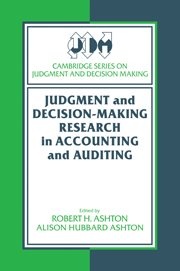Book contents
- Frontmatter
- Contents
- Contributors
- Series Preface
- Preface
- Acknowledgments
- Part I Overview
- Part II Judgment and decision-making research involving users of accounting information
- 2 Decision-making research in managerial accounting: Return to behavioral-economics foundations
- 3 Experimental incentive-contracting research in management accounting
- 4 Judgment and decision-making research in financial accounting: A review and analysis
- 5 The individual versus the aggregate
- Part III Judgment and decision-making research involving auditors of accounting information
- Part IV Conclusion
- References
- Index
4 - Judgment and decision-making research in financial accounting: A review and analysis
Published online by Cambridge University Press: 03 May 2010
- Frontmatter
- Contents
- Contributors
- Series Preface
- Preface
- Acknowledgments
- Part I Overview
- Part II Judgment and decision-making research involving users of accounting information
- 2 Decision-making research in managerial accounting: Return to behavioral-economics foundations
- 3 Experimental incentive-contracting research in management accounting
- 4 Judgment and decision-making research in financial accounting: A review and analysis
- 5 The individual versus the aggregate
- Part III Judgment and decision-making research involving auditors of accounting information
- Part IV Conclusion
- References
- Index
Summary
Financial reporting provides information about business enterprises that is useful for the decisions of individuals and groups external to businesses, including investors, creditors, suppliers, customers, labor unions, financial analysts, and regulatory authorities (Financial Accounting Standards Board, 1978). The types of information included in financial reports, as well as accounting methods used to generate this information, are governed by bodies such as the Securities and Exchange Commission and the Financial Accounting Standards Board. Although the information is primarily historical, its main purpose is to help decision makers predict future cash flows that will be generated by a business. Thus, financial reporting provides information for “risky” decision making, i.e., decisions in which outcomes are not known with certainty.
Since the 1960s, accounting researchers have used theories and methods from cognitive psychology, particularly the judgment and decision–making literature, to examine decision–making issues in financial reporting. Studies in this area have individuals make judgments and decisions about businesses using accounting information. Some studies employ an experimental method in which one or more variables, such as the amount of information, differ between groups of subjects to determine the effect of these variables on judgments and decisions. Other studies provide all subjects with identical information and either model subjects' judgments or study the process by which judgments are made.
- Type
- Chapter
- Information
- Publisher: Cambridge University PressPrint publication year: 1995
- 37
- Cited by



